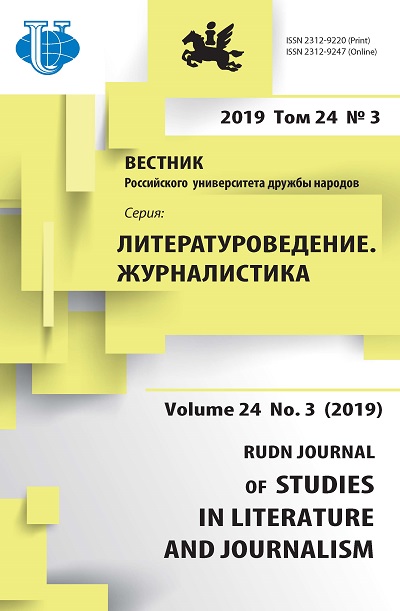Novel “Doctor Zhivago” by B.L. Pasternak: the specifics of the issue of the cultural hero
- Authors: Morozov S.V.1
-
Affiliations:
- Lomonosov Moscow State University
- Issue: Vol 24, No 3 (2019)
- Pages: 366-375
- Section: LITERARY CRITICISM
- URL: https://journals.rudn.ru/literary-criticism/article/view/22332
- DOI: https://doi.org/10.22363/2312-9220-2019-24-3-366-375
- ID: 22332
Cite item
Full Text
Abstract
The article raises the question of the cultural landmarks of the heroes of the novel B.L. Pasternak “Doctor Zhivago”. As is known, the plot of the work takes place at the turn of the eras, and for some heroes this becomes an incentive to think about their cultural self-determination. Their actions and behavior model are directly related to the attitude to cultural reality described in the work, and sometimes even aimed at its transformation by practical, revolutionary methods. A certain catalytic role in relation to culture is one of the criteria of a cultural hero. From this point of view, a comparative analysis of the positions of B.L. Pasternak and A.A. Blok in relation to the revolutionary events of 1917, their reflection in “Doctor Zhivago” and in the poem “Twelve” is carried out. The image of Yuri Zhivago is investigated from the point of view of the type of cultural hero - the Ascetic. The characteristic is given to the image of Antipov (Strelnikov) as a representative of the type of cultural hero - Conquistador. It has been established that Zhivago’s ascetic cultural position is based on loyalty to timeless ideals, an idea of the aesthetic potential of the Personality in relation to reality, while Antipov's (Strelnikov) actions are aimed at suppressing the individual human principle and, therefore, are devoid of a genuine creative component that nourishes the culture of mankind.
Keywords
About the authors
Sergey V. Morozov
Lomonosov Moscow State University
Author for correspondence.
Email: frosttt_78@mail.ru
postgraduate student of Philological Faculty
1 Leninskie gory, bldg. 51, Moscow, 119991, Russian FederationReferences
- Berezovskaya S.S. Koncept Kul’turnogo geroya kak universaliya kul’tury [The concept of the Cultural Hero as a universal of culture] // Vestn. Tom. gos. un-ta. 2010. No. 338. Pp. 68–71.
- Berezovskaya S.S. Kul’turnyj geroj: dinamika razvitiya [Cultural hero: dynamics of development] // Vestn. Tom. gos. un-ta. 2014. No. 387. Pp. 75–83.
- Blok A.A. Polnoe sobranie sochinenij: v 20 t. T. 5 [Complete works: in 20 vols. Vol. 5]. Moscow: Nauka Publ., 1999.
- Vlasov A.S. Predvestie svobody (o stihotvorenii B. Pasternaka “Skazka” v kontekste romana “Doktor Zhivago”) [A harbinger of freedom (on B. Pasternak’s poem “Tale” in the context of the novel “Doctor Zhivago”)] // Duhovno-nravstvennye osnovy russkoj literatury: sb. nauch. statej. Kostroma: KGU imeni N.A. Nekrasova, 2009. Pp. 270–275.
- “Doktor Zhivago” vchera i segodnya: kruglyj stol Literaturnoj gazety [“Doctor Zhivago” yesterday and today: round table of Literary newspaper] // S raznyh tochek zreniya: “Doktor Zhivago” B. Pasternaka / sost. L.V. Bahnov, L.B. Voronin. Moscow: Sovetskij pisatel’, 1990. Pp. 265–283.
- Pasternak B.L. Poln. sobr. soch.: v 11 t. [Complete works: in 11 vols]. Moscow: Slovo Publ., 2003–2005.
- Provokacionnaya vylazka mezhdunarodnoj reakcii [A provocative sortie of international reaction] // Literaturnaya gazeta. 1958. 25 oktyabrya.
- Romanova I.V. Semanticheskaya struktura “Stihotvorenij Yuriya Zhivago” v kontekste romana i liriki B. Pasternaka [The semantic structure of “Poems by Yuri Zhivago” in the context of the novel and lyrics of B. Pasternak]: dis. … cand. philol. sciences. Smolensk: SGPI Publ., 1997. 275 s.
- Skorospelova E.B., Chaglyyan Sh.K. Semantika i funkcii motiva meteli v romane B. Pasternaka “Doktor Zhivago” [Semantics and functions of the blizzard motive in Pasternak’s novel “Doctor Zhivago”] // Filologicheskie nauki. Voprosy teorii i praktiki. 2016. № 4–2 (58). Pp. 41–44.
- Taho-Godi E.A. “I obraz mira, v slove yavlennyj..” (“slovo” v romane B.L. Pasternaka “Doktor Zhivago”) [“And the image of the world revealed in the word..” (“word” in the novel by B.L. Pasternak “Doctor Zhivago”)] // Portal “Slovo”. https://www.portalslovo.ru/philology/37199.php?ELEMENT_ID=37199 (accessed: 04.08.2018).
- Flejshman L. Svobodnaya sub”ektivnost’ [Free subjectivity] // Pasternak B.L. Poln. sobr. soch.: v 11 t. T. 1. Moscow: Slovo Publ., 2003. Pp. 5–60.
- Shevyakova A.V. Kul’turnyj geroj i trikster: funkcional’nye i ontologicheskie skhodstva [Cultural hero and trickster: functional and ontological similarities] // Vestnik Permskogo universiteta. Filosofiya. Psihologiya. Sociologiya. 2015. No. 1(21). Pp. 32–42.
Supplementary files















